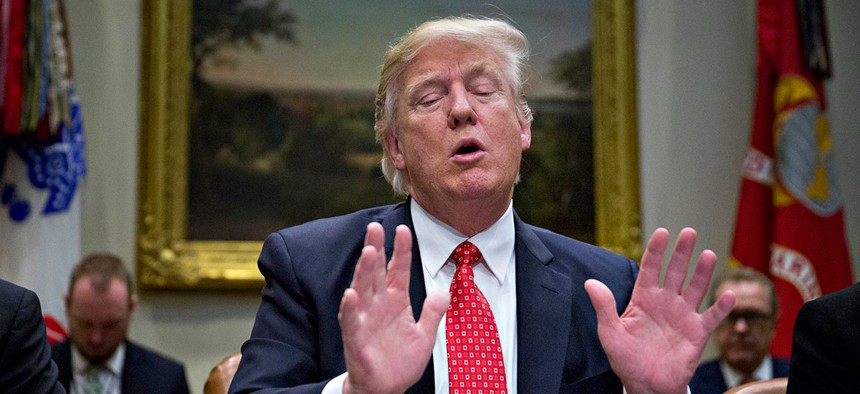
Andrew Harrer / Pool via CNP /MediaPunch/IPX
Proof That All People in Power Should Get a Good Night's Sleep
A new study suggests lack of sleep makes it harder to regulate negative emotions, and could make managers and bosses more likely to lash out.
Donald Trump does not believe in a good night’s sleep.
He fires off tweets at all hours and reportedly once called his national security advisor at 3am to ask a routine economic question. In an interview on Fox, Trump said he’s routinely up past midnight before waking at 5 am. That actually may be an improvement for him: at a 2015 campaign appearance, he boasted he got by on only three or four of sleep. “You know, I’m not a big sleeper, I like three hours, four hours, I toss, I turn, I beep-de-beep, I want to find out what’s going on,” he said.
We know intuitively that we function better with more rest, and there’s scientific research to support that most people are less effective if they don’t get at least seven hours of sleep. And sleep deprivation costs the economy billions of dollars.
Now, a new study suggests lack of sleep makes it harder to regulate negative emotions, and could make managers and bosses (and presidents) more likely to lash out and be overly punitive. The paper, from a team of professors at the universities of Washington and Virginia, examined the sentencing practices of judges, and found that sleep-deprived judges hand out harsher prison sentences.
The researchers looked at a decade’s worth of US sentencing data, and while they couldn’t know the sleep pattern of every judge, they looked at a date when almost everyone needs more sleep: the Monday in March after daylight savings begins, when a hour is cut out of the night. “Sleepy Monday,” as the researchers dub the day, is already associated with an increase in workplace injuries and reduced productivity.
Factoring out other variables, the team found judges gave 5% per longer sentences on Sleepy Monday than on the Mondays immediately before or after. Christopher Barnes, one of the professors, suggests in an article for Harvard Business Review that this effect of sleep deprivation is probably greater in non-judicial settings, where there isn’t the same emphasis on fairness and due process.
Bosses who don’t get enough sleep are more likely to treat subordinates unfairly, leading to a toxic work environment, he said. That’s something all managers should avoid, particularly if they’re also leaders of the free world.






